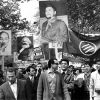The Dawn of a New Age
1968 in words and pictures: Six Must-Read Books in cooperation with the Frankfurt Book Fair.

“Adorno for the Children of the Rubble, A history of 1968”
Heinz Bude: Adorno für Ruinenkinder, Eine Geschichte von 1968, Carl Hanser Verlag
The events of ’68 have a polarizing effect, even today. Heinz Bude has spoken to men and women who experienced things at first hand. They all share the experience of the passage from childhoods spent between post-war ruins into a world of new freedoms. But from Adorno they inherited the notion that the more you understand of society, the harder it is to make yourself useful to society. With the bleakest of pasts behind them they wanted to change society in order to find their own lives. Now, 50 years after the revolts, it is time to understand how much their private burdens played a role in the political events.
“Now – A History of My Adventures with the Imagination”
Karl Heinz Bohrer: Jetzt – Geschichte meines Abenteuers mit der Phantasie, Suhrkamp
Karl Heinz Bohrer is considered being one of the most pugnacious of German intellectuals. As the head of the literature section of the FAZ – Frankfurter Allgemeine Zeitung – he was controversial even among his colleagues. As the editor of the intellectual magazine Merkur he was infamous for his bold topics, and as university teacher, he was a figure of hate for the Left. In “Now”, Bohrer spans his life story since the late 1960s, from his conflicts with the FAZ and his friendship with Ulrike Meinhof, through his realistic and highly subjective experiences during many years spent living abroad and in his university appointments, up to his uncompromising overview of the contemporary “situation”.
“1968 in Berlin: A historical city guide, 40 years since 1968 – Review and perspectives”
Ingo Juchler: 1968 in Berlin: Schauplätze der Revolte, Ein historischer Stadtführer, Bebra Verlag
West Berlin was a focal point for the student uprisings. This book traces the events, from the first demonstration against Vietnam War in front of America House in Hardenbergstraße and the shooting of Benno Ohnesorg at the Deutsche Oper, through to the freeing of the later RAF-terrorist Andreas Baader. The protest activities in East Berlin, primarily demonstrations against the invasion of Czechoslovakia by Warsaw Pact troops, are also examined here for the first time.
“Much Achieved, Much too Slowly, On the process of emancipation”
Barbara Sichtermann: Viel zu langsam viel erreicht. Über den Prozess der Emanzipation, zu Klampen
For around 200 years now Western women have been triggering changes, slowly at first, and with setbacks; then rapidly and since the 1970s, furiously. The renowned journalist and 1968 intellectual Barbara Sichtermann shows us what has changed over the years as a result of the women’s movement, and she doesn’t ignore the problems now emerging from the modern competition between the sexes.
“Blind Spots of the Red Army Faction”
Wolfgang Kraushaar: Die blinden Flecken der RAF, Klett-Cotta
In the autumn of 1977, with the kidnapping and murder of Hanns Martin Schleyer, and the hi-jacking of the plane „Landshut “, the atrocities of the RAF reached their peak. But the origins of the RAF’s violence lie further back in the early phase of the apparently harmless ’68 movement. The protagonists, who styled themselves anti-bourgeois heroes, were themselves deeply rooted in post-war, middle-class Germany. Kraushaar sheds new light on the thicket of misconceptions and idealization, and draws some surprising conclusions.
“Hold on to Your Love, Rio Reiser”
Gerd Möbius: Halt dich an deiner Liebe fest, Rio Reiser, Aufbau
As the events of 1968 reverberated, the band Ton Steine Scherben, with their anthems to anarchy, „Keine Macht für Niemand“ (No power for nobody) and „Macht kaputt, was euch kaputt macht“ (Destroy what destroys you), became the voice of the left-wing scene – a scene that brought together alternative people, house squatters and men avoiding their military service, all experimenting with new ways of living. At its heart was Rio Reiser, co-founder of the „Scherben“, as brilliant as he was eccentric. In this book, his brother Gert Möbius draws on his own notes as well as Reiser’s diaries to describe those wild years in which the world was turned upside-down and then put back in place.
